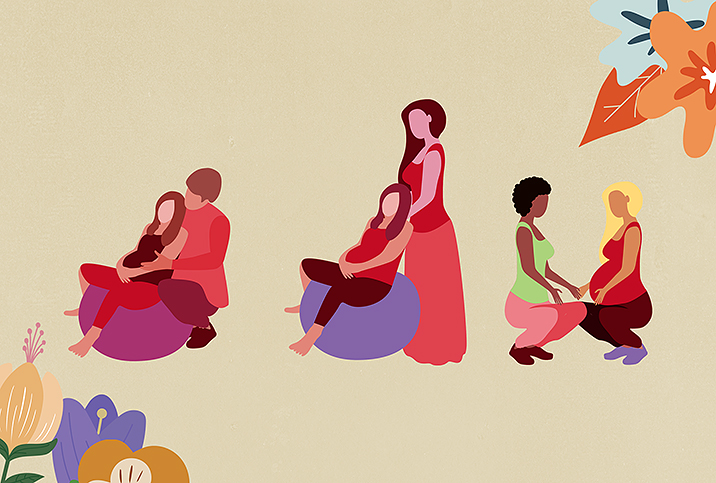What Is a Pregnancy Doula and Can They Make Birthing Better?

Key Points
- Pregnant and postpartum people can benefit from various types of support, from medical care to practical help.
- Birth and postpartum doulas can offer informational, emotional, and physical support to birthing people and their families.
- Working with a doula may increase the chances of a positive pregnancy and birth experience, according to research.
The pregnancy and birth experience can be incomparably beautiful. It can also be daunting. Alongside medical professionals such as a doctor or midwife, a doula can be a pillar of support as you navigate this journey.
What is a doula?
Doulas are trained professionals who offer continuous informational, physical, and emotional support to birthing people and their families through the prenatal, birth and postpartum periods, according to DONA International, the first and most extensive doula training and certification organization.
"Doulas play a valuable role in the healthcare system alongside doctors and nurses," said Meleen Chuang, M.D., an OB-GYN and clinical associate professor at Family Health Centers at NYU Langone Health in New York City.
What does a doula do?
While doctors, nurses and midwives focus more on the medical aspect of care, doulas advocate for patients' preferences and choices and provide personalized nonmedical services, Chuang explained. They can be vital to a care team and enhance a patient's overall experience.
"They can help expectant parents understand medical procedures, explore various birthing options and make informed decisions that align with their values and desires," she said.
There's more. A pregnancy doula can help in other, more specific, ways.
"They can provide comfort measures such as relaxation techniques, breathing exercises and positioning suggestions during labor. Doulas can also offer emotional support, reassurance and encouragement, which can positively impact the birthing process," Chuang said.
Different kinds of doulas are specialized for distinct stages of family planning and pregnancy, according to Rhonda Okoth, M.P.H., R.N., a doula, clinical nurse researcher and evidence-based birth instructor at Saint Jude's Children's Research Hospital in Memphis.
The different kinds of doulas include the following:
- Birth doulas attend the birth.
- Fertility doulas assist a person or couple having trouble conceiving.
- Full-spectrum doulas can be involved in every phase.
- Postpartum doulas help the parent(s) after a baby is born.
- Prenatal doulas provide pregnancy support.
Alexia McKay, a publisher, freelance journalist and publicist in the Tampa, Florida, area, was about five months into her first pregnancy when she hired a full-spectrum doula. She was already motivated to work with a doula before becoming pregnant but became more confident with her decision after receiving a diagnosis of cholestasis, a complication that required her care team to induce labor at 36 weeks due to the risk of stillbirth.
McKay said she was concerned about the United States' high rate of maternal mortality and adverse birth experiences, particularly for women of color. She believed a doula could be a valuable ally.
"[I saw] the importance of not only being my own advocate but having somebody else there to advocate for me when I can't speak for myself or who may see something that the doctor may not see or ignore," she said. "Also, as a new mom, I just wanted to be educated on the experience."
Advocacy and education are among the most crucial doula responsibilities, Okoth noted.
"Having somebody that can advocate for you during pregnancy and labor and delivery is one of the biggest benefits a doula can bring besides the physical and emotional support you get throughout the pregnancy and labor process," she said.
Recommended
- The True Cost of Pregnancy: Family is priceless, but having a baby is expensive. Knowing what to expect can help you plan.
- Know Your Rights During Labor and Delivery: Birthing can be empowering, but it can also be traumatic. Understand your rights to maintain bodily autonomy in the delivery room.
- Do I Need a Birth Plan?: You may not be able to plan every aspect of labor and delivery, but having a birth plan could help you feel more prepared.
What is a birth doula?
"Birth doulas help parents prepare for labor and delivery and support them in the birthing process," Okoth said.
A birth doula can perform the following duties:
- Advocate for the pregnant person throughout the process.
- Assist a birthing person out of the shower, bath or birth tub.
- Assist with breath work before and during labor.
- Connect parents with resources and services, such as pelvic floor therapy, social services and support groups.
- Educate parents about the birthing process.
- Give the birthing person drinks or ice.
- Help a birthing person get into different positions to assist with progressive labor.
- Help a birthing person relax with, for example, aromatherapy or soothing music.
- Help the birth partner—such as a spouse—support the birthing person.
- Massage the birthing person or apply hot or cold packs.
- Offer encouragement and emotional support.
What is a postpartum doula?
"Postpartum doulas assist parents in the first several weeks after delivery," Okoth said.
Postpartum doula services include the following:
- Assist with emotional and physical recovery.
- Care for older children.
- Connect parents with local resources, including parenting classes, lactation support, pediatricians and postpartum depression (PPD) support.
- Do light housework or meal prep.
- Educate parents about parent-child bonding, infant soothing, bathing and swaddling.
- Provide evidence-based information on topics such as lactation and feeding.
- Run light errands.
- Watch the baby so parents can nap or run errands.
What is the difference between a doula and a midwife?
"Doulas provide continuous assistance, comfort measures, and advocacy, focusing on well-being and empowerment," Chuang said. "Doulas do not provide medical care, diagnose conditions or perform medical procedures."
Midwives are healthcare professionals trained in both medical and holistic care.
"They are equipped to provide comprehensive prenatal, childbirth and postpartum care, including medical exams, prenatal care, labor and delivery, medical interventions, and guidance on breastfeeding and newborn care," she said.
"Doulas mainly provide emotional and informational support and collaborate with midwives or doctors to provide a holistic, patient-centered pregnancy, birth and postpartum experience, Okoth said.
6 Embarrassing Childbirth Questions Answered: From pooping to orgasm during birth, we've asked the experts so you don't have to.
What is the difference between a doula and a birthing coach?
Birth coaches and doulas can help create a better delivery experience, but there are distinctions.
"Birthing coaches are trained similarly to other coaches where the client claims their experience, and the coach asks questions and holds them accountable," said Kristin Revere, a certified birth and postpartum doula, transformational birth coach and owner of Gold Coast Doulas in Grand Rapids, Michigan.
They often meet with the pregnant person during the prenatal period to help them prepare for labor and delivery, but they typically don't attend the birth.
"Doulas offer some coaching during labor, but they primarily provide physical, emotional and informational support, including in the delivery room," she said.
Are there any benefits of a doula?
A doula's presence on the birth team may decrease the overall cesarean rate by 50 percent, shorten the length of labor by 25 percent, reduce oxytocin usage by 40 percent and reduce requests for an epidural by 60 percent, according to the American Pregnancy Association (APA).
Emotional support provided by a doula may improve outcomes for women in labor, a 2019 report suggested. People who work with doulas tend to have higher incomes and see healthcare professionals regularly, which may also contribute to this finding.
Moreover, the support of a doula may reduce anxiety and stress and help expectant mothers feel more confident and autonomous, according to a 2023 study. The findings indicated that working with a doula may help reduce labor time.
What are the downsides of a doula?
For one, the cost of hiring a doula may be a downside for some, Okoth noted.
"Additionally, not all doulas are equally qualified," she said. "There are several doula education and certification programs, some more robust than others. It's important to vet prospective providers carefully."
One way to check your doula's credentials is to make sure they obtained their training and certification from a reputable organization. You should also ensure they meet the minimum certification requirements for your state according to current state approaches and recommendations shared by the National Health Law Program.
Finally, some hospitals limit the number of people allowed in the delivery room. Talk with your healthcare team ahead of time to determine who is permitted.
Is using a doula expensive?
"Fees vary substantially depending on the doula's experience, the service package and your location," said Amy Gilliand, Ph.D., a doula, a research fellow at UW Madison School of Human Ecology and an AASECT-certified sexuality educator supervisor in Madison, Wisconsin.
"Some providers offer sliding scales and work with families to make services more affordable," Okoth said. "Doulas and organizations may also help families find third-party financial resources to offset costs."
Talking to Your Teen About Birth Control: Having 'the talk' doesn't have to be awkward.
How much does a doula cost?
Costs will vary depending on your location.
"You're not going to pay the same in Bismarck, South Dakota, that you would in Atlanta," Gilliand said.
Birth doulas tend to charge a flat fee, which includes a set number of visits and specific services. Some doulas charge as little as $500, while others may charge as much as $5,000, per the NYC Doula Collective.
In Revere's community in Grand Rapids, the average cost is $1,200 to $1,500. The range is about $1,000 to $2,000 in Okoth's location in Memphis.
"Postpartum doulas typically charge by the hour," Revere said.
That rate can range from $15 to $50, according to the American Pregnancy Association (APA).
Does insurance cover a doula?
Some insurance companies and plans pay for doula services, but it's not the norm, according to Gilliand. Typically, this coverage comes from flexible spending accounts or integrative health services.
Okoth's organization sometimes helps clients write reimbursement letters to their insurance provider to justify why the coverage is needed. Successful reimbursements are only secured sometimes.
"Certain state Medicaid programs also have doula pilot programs that cover services," she said.
How do I find a doula?
Ask your doctor for a doula recommendation. They may know of a doula who works well with your healthcare team.
Several sites, according to Chuang and Okoth, have directories where you can search for doulas in your area, including:
- BirthNetwork National
- Childbirth and Postpartum Professional Association (CAPPA)
- DONA International
- The National Black Doulas Association
You can also connect with local doula organizations or agencies or request recommendations on social media websites or online forums.
What Are the Best Sex Positions for Men With ED?: Certain sex positions work better than others for guys dealing with erectile dysfunction.
What questions should I ask a prospective doula?
As you would with any service provider, interview multiple doula candidates and check their qualifications and references carefully. Ensure their philosophy and personality are compatible with yours.
"I think people should be open about what they fear and what matters to them in their birth and pay attention to how the doula receives that," Gilliand said. "Do they listen seriously and thoroughly to you? Is the doula an effective communicator? Do they make you feel safe? Do you feel this doula believes in you and your ability to birth the way you want?"
To find the right doula for you, Chuang and Okoth suggest you ask the following questions:
- Have you attended births similar to the type I'm planning, such as a home birth or hospital birth?
- How do you advocate for a birthing person's needs and desires with medical professionals?
- How do you help people make informed decisions during labor?
- How do you typically provide support during labor and the postpartum period?
- How long have you worked as a doula?
- How many births have you attended?
- What kind of training and certification do you have?
- What is your availability around my estimated due date, and do you have a backup doula in case you're unavailable?
- What is your birth philosophy and approach to supporting people in labor?
"Find someone you connect with, who will help you feel safe and comfortable at your most vulnerable," Gilliand said.
"When you step into the labor and delivery suite, you want to know that you have somebody on your side, that you can trust and that's going to support you in the way you need it," Okoth added.
Can you fire a doula?
"You're free to fire your doula if you don't feel it's a good fit," Okoth said. "Even though most doulas are entrepreneurs, we don't want anybody to stay with a doula they don't have a good relationship with."
If you're bound by the terms of a contract, you might lose a deposit or the money you already paid. Even so, Okoth said, you have the right to pick another doula, the same way you can pick another medical provider.
The bottom line
A doula can be an incredible resource for birthing people, helping them feel more comfortable, confident and cared for. If you're considering hiring a doula, ensure they're trained and certified and that their philosophy and personality mesh with yours.
Often, a doula-parent relationship is an intimate bond that lasts long after the contract has ended.
"I still have a great relationship with her to this day. My baby is four months old, so it hasn't been that long, but we still have an open means of communication," McKay said. "If I have any questions or anything parenting-related that I need some insights on, I'll text or call my doula, and she's still there."


















